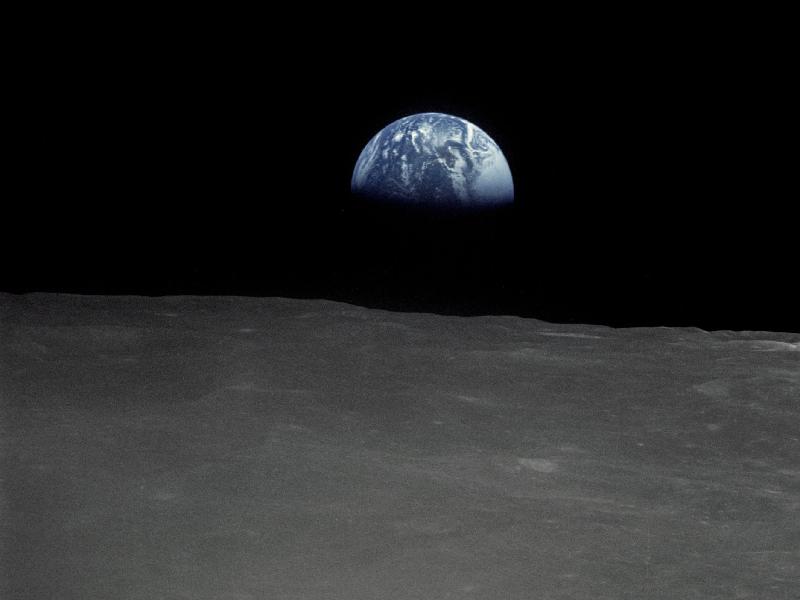Earth Day 2009
It seems only appropriate on Earth Day 2009 to talk about our planet in the scope of the much bigger scale of time and space. Are we the six billion human residents on this planet along with the other animals, insects and microbes all there is in  this vast universe?
this vast universe?
This week Edgar (Ed) Mitchell stood at the National Press Club and told the audience that UFO’s were real and that there was an “alien presence” here on Earth. While that sounds a tad more like the fictional Agent Fox Mulder of X-File’s fame than the former astronaut and sixth man to walk on the moon it is the question we all would like the answer to – Is there intelligent life beyond planet earth? Ed Mitchell made it seem like someone already has the definitive answer, but I doubt that.
UFOlogy is a topic that captures the interest of many by virtue of being one of those topics that a few represent as fact by having witnessed a UFO or having an even more dramatic encounter face to face with alien beings, but the proof is often vague, ambiguous, disputed, known only to shadowy operatives or can’t be substantiated. Stories of downed UFO being quickly seized by the military in the dark of night and scurried off to secret locations to be reversed engineered along with the alien inhabitants is the stuff of science fiction. Heresy you say? Let’s separate the key elements of the argument first.
1. Is there life outside of planet earth?
While we have no direct proof it is with high degree of probability that we can say yes. Where we once thought we were alone in our own solar system we can’t unequivocally make that statement any longer. We are learning that life finds a way to thrive even in the harshest conditions and microbial life may live a few meters down in the Martian soil or in the oceans of Europa or Enceladus. Our criteria for “life as we know it” required liquid water and oxygen. Suddenly, even in the cold far distant reaches of our solar system the case for liquid water is strong making at least microbial life possible. It is only a matter of time perhaps ten years or less before we will find some form of living organism. Mars is the likely candidate. Europa a solid bet, but getting a probe funded and launched to land and drill to the ocean below seems more than a decade out.
2. Is there intelligent life beyond our solar system?
Next time you’re at the beach grab a handful of sand and let it sift through your fingers. Then imagine that every grain of sand was a star. Taking it one step further imagine that you were standing in three feet of sand and that sand covered the entire surface of the earth. Now you’re close to the number of stars in our universe. Of all the stars formed by the same process (like each grain of sand) that only one created the ideal conditions for life seems to be “astronomical”. It would be analogous to saying that there was only one black grain of sand in the trillions and trillions of grains you were standing in even though they all had the same origins and composition. That we’ve detected planets orbiting other stars confirms that the formation of planets around stars is a common occurrence. Our sun and our location in our galaxy seem “average”. There is nothing extraordinary that gives us cause to believe that the formation of the earth was unique. Drake’s equation tried to postulate the likelihood of such an occurrence, but equations aren’t necessary. This is a pure numbers game. Given the age of the universe and vast number of chances for intelligent life to develop (number of stars) it would be the most unlikely of unlikely scenarios that an average star would be the only one to get the mix for life right and that life became the only one to develop intelligence. We’ll likely will never know, but as they said in the movie Contact “If we are the only ones it sure would be a waste of space”.
3. Have they visited Earth?
Let’s go back to the sand analogy for a second Take all of that sand (three feet covering the entire Earth) and for the sake of argument assume that each grain is white, but a handful of the trillions of grains we’re black say ten thousand. Spread each grain four miles apart in every direction from the other and you’re looking at the scale of the universe. When you’re done pick a place to stand and now find those black grains of sand, but don’t move from your spot. With some equipment you might spot some grain of sands closest to you and maybe you’ll get lucky and one will be another black one like yours, but the odds wouldn’t favor you. You can’t invent a technology to locate those few black grains out of the trillions – size, distance and time are against you. You know they exist, but finding them is beyond your capability. Even if there is an advanced civilization out there having them find the small and ordinary Earth in the vastness of space just doesn’t seem possible. There is all that talk about wormholes and warping space to cover vast distances in a short period of time, but if we had that technology where would we use it to go? Exactly. We don’t have a clue and our E.T. friends are likely in the same boat.
Following the latest stories and history of UFOs is fun and entertaining, but rather than wait for E.T. to find us we need to reflect on our own planet and realize that someday the survival of the human race will depend on venturing beyond planet Earth. Look how far we’ve advanced in the past two thousand years and we have millions left to improve, but on Earth Day it is important to look at the cost of our progress. In the past two hundred years alone we’ve nearly exhausted some of the Earth’s resources. How will we survive ourselves unless we look to the stars? The cosmic end of Earth is way off in the distant future. In a billion years our sun will have begun to heat up at it marches towards the end of its life making life difficult. Two and a half billion years the sun will have become too hot for life on Earth and five billion years from now the sun will have swelled to encompass the Earth. Long before that we will have exhausted the resources of this planet and will have hopefully begun the process of using our technology to make other planets habitable or at least have the ability to use the resources outside of Earth. If we don’t then it will be us that will be phoning E.T. to come save us.
